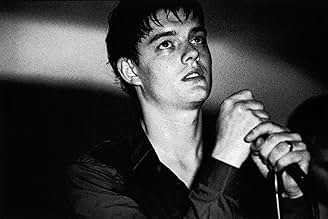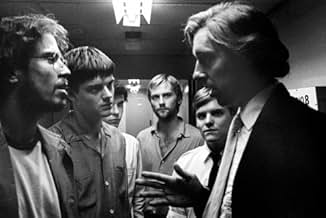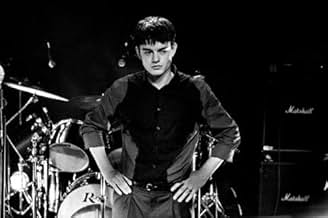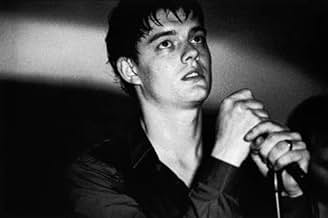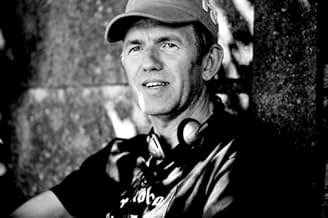AVALIAÇÃO DA IMDb
7,6/10
70 mil
SUA AVALIAÇÃO
Relata a história de Ian Curtis, o enigmático cantor da Joy Division cujos problemas pessoais, profissionais e românticos o levaram ao suicídio aos 23 anos.Relata a história de Ian Curtis, o enigmático cantor da Joy Division cujos problemas pessoais, profissionais e românticos o levaram ao suicídio aos 23 anos.Relata a história de Ian Curtis, o enigmático cantor da Joy Division cujos problemas pessoais, profissionais e românticos o levaram ao suicídio aos 23 anos.
- Direção
- Roteiristas
- Artistas
- Ganhou 1 prêmio BAFTA
- 31 vitórias e 36 indicações no total
Martha Myers Lowe
- Ian's Sister
- (as Martha Myers-Lowe)
Mary Jo Randle
- Debbie's Mother
- (as Mary-Jo Randle)
- Direção
- Roteiristas
- Elenco e equipe completos
- Produção, bilheteria e muito mais no IMDbPro
Avaliações em destaque
It's 1973 Macclesfield, England. Ian Curtis (Sam Riley) is a quiet enigmatic student. He marries Debbie Woodruff (Samantha Morton) in 1975. He works as an employment agent. On June 4, 1976, they attend a small Sex Pistols concert. Also in attendance are Bernard Sumner, Peter Hook, and Terry Mason. Ian joins them as their lead singer. They call themselves Warsaw and eventually Joy Division.
There is a sense of disconnection from this movie and a mystery about Ian Curtis. Sam Riley's performance, the long takes, and the black and white photography all make Ian an enigma. It's a slow burn but compelling. The tone is sad and respectful. It's very fitting of the band and its music.
There is a sense of disconnection from this movie and a mystery about Ian Curtis. Sam Riley's performance, the long takes, and the black and white photography all make Ian an enigma. It's a slow burn but compelling. The tone is sad and respectful. It's very fitting of the band and its music.
Making the leap from photographer to music video director to film director, Anton Corbijn's feature length debut 'Control' is quite simply stunning. Shot entirely in black and white it tell the story of Ian Curtis the lead singer with Manchester band Joy Division but its also much more than that it also tells of one mans journey into the heart of darkness (Apocalypse Now is mentioned in the film) a journey of fear, paranoia, illness and depression. Curtis has been played in films before but only as bit parts (24 hour party people etc) here he is portrayed breathtakingly by Sam Riley who played Mark E Smith in 24 hour party people and when he first appears on the screen I have to admit I wasn't convinced but as Ian the person grows so too does Riley into the role and at times he has him so down to a tee its hard to imagine its not the real Curtis up there. The rest of the band are pretty good as well but are only really second fiddle to Riley but you have to give them credit for learning all the songs and playing them live rather than mime. Samantha Morton is great as the put upon wife Deborah and Craig Parkinson is convincing enough as Tony Wilson but apart from Riley's stand out performance its Toby Kebbell as manager Rob Gretton who has some of the best lines and has come so far since his role in 'Dead Man's Shoes'. The cinematography is a visual feast for the eyes, being shot in black and white adds to the mood and gives a haunting feel that echo's the music and lyrics of the band, it also means (and I guess its Corbijn's photography background) that so many of the shots in the movie could be still images they are framed so well. Although never really explained in terms of answers, Curtis's illness from the seizures to the depression and the hopeless sense of falling apart reminded me of Catherine Deneuve in Polanski's 'Repulsion' another black and white film that deals with madness. I guess that treating mental illnesses was still in its infancy in the seventies, yes we'd stopped electro-shocking people but medications were still being developed and trialled. It seems it was very easy for Curtis to reach a certain point what with juggling home, life on the road, his condition and the pressure of increasing fame but when it came to helping him out he really was on his own and did feel a sense of 'isolation'. But with a story that has a widely known end point its more about the journey and here Corbjin punctures the narrative with some truly witty moments while leading up the incredibly moving and inevitable finale. Handled brilliantly by all involved this is another example of a great British film that deserves all the accolades it is receiving and if this performance is anything to go by expect Riley to be very big indeed.
Control, the story of Ian Curtis, singer of British alternative band Joy Division. The film is made in black and white, which adds a certain edge to the film. There isn't much drama or fast-paced scenes (until the very end, I guess), and that seems to be what everyone criticizes about the movie. Why do you think the director wanted it black and white? If it had been a sincerely boring film, why release it?
Of course they made up some aspects of Ian's life, but the fact is that Ian was a dull, depressed human being. He couldn't handle love, or fame overall. He doesn't show signs of emotion in the film, and doesn't speak much at all. Truth is, black and white was exactly what he saw, while he was spiraling towards the end of his life.
The acting is incredible. Absolutely spot on. Very very noteworthy.
I enjoyed Control, but that's only because I love indie films and rock and roll movies. If you're looking into this movie expecting some delicious drama and edge-of-your-seat thrills, just don't watch it. It's about a man who gradually fell apart, who gradually lost control. And if you can't see that in the film, it's definitely not worth watching.
Of course they made up some aspects of Ian's life, but the fact is that Ian was a dull, depressed human being. He couldn't handle love, or fame overall. He doesn't show signs of emotion in the film, and doesn't speak much at all. Truth is, black and white was exactly what he saw, while he was spiraling towards the end of his life.
The acting is incredible. Absolutely spot on. Very very noteworthy.
I enjoyed Control, but that's only because I love indie films and rock and roll movies. If you're looking into this movie expecting some delicious drama and edge-of-your-seat thrills, just don't watch it. It's about a man who gradually fell apart, who gradually lost control. And if you can't see that in the film, it's definitely not worth watching.
For every icon, there is an unknown predecessor who paves the way. Before there was Kurt Cobain, there was Ian Curtis, lead singer of the post-punk band, Joy Division. 27 years after his tragic death, Curtis' incredible contribution to music is finally being recognized in Anton Corbijn's film, "Control." It's only fitting that Corbijn serve as director since it was his early photographs of Joy Division that reflected the band's dark, introspective songs. Corbijn went on to photograph and direct videos for such musical greats as U2, David Bowie, Depeche Mode, R.E.M. and Metallica.
With his first feature film, Corbijn avoids the pitfalls of many music video directors who inundate us with flashy and unnecessary edits and camera angles. Instead, he lets the stark black and white of the film tell the story of a lead singer tortured by epilepsy, guilt, depression and suicidal thoughts. The use of black and white also captures the factory town of Manchester, England in the late 1970s, a city crumbling under industrial and economic stress. Manchester has since rebounded and is once again thriving.
Curtis is played by relative newcomer, Sam Riley, who's quiet and unassuming approach portrays an artist inspired by his heroes, David Bowie and Iggy Pop. At a chance meeting following a Sex Pistols concert, Curtis bonds with three fellow musicians to form the band.
As Joy Division begins to flourish, Ian's relationship with his young wife, Deborah, continues to distance itself. Academy Award nominee, Samantha Morton plays the confused wife trying to understand her husband's depressed soul. The film is based on Deborah Curtis' autobiography, "Touching From A Distance", so it comes as a surprise that Morton's character does not have more scenes in the movie.
The key to Control is understanding Curtis' depression, which the film accomplishes to near perfection. As he battles epilepsy, the young singer lives in constant fear that his next seizure will be his last. His only option is to swallow a daily cocktail of prescription drugs with side effects so terrible, that most of us would rather tempt fate than endure the aftermath of the pills.
Ian's spirit is also tortured by overwhelming guilt brought on by an extra-marital affair with a part-time journalist, played by Romanian-born Alexandra Maria Lara.
The most telling scene comes when Ian records an in-studio track for the song "Isolation." While Curtis stoically sings into the microphone, his band mates are distracted with the normal banter that typically occurs in a studio.
"Mother, I tried, please believe me. I'm doing the best that I can. I'm ashamed of the things I've been put through. I'm ashamed of the person I am." The lyrics seem to fall on deaf ears except for those of the sound engineer who refers to it as "genius." But Ian's brilliance is also a desperate cry for help ignored by everyone in the studio.
The 27-year-old Riley does an excellent job of capturing Curtis' aloofness on stage. Singers such as Jim Morrison, Kurt Cobain and even the early years of Michael Stipe would often drift into the moment of the song. But when Curtis performed, he immersed himself into his own world where the music simply served as the soundtrack. Riley skillfully draws us into Ian's dark world with a range of subtle head movements and facial expressions to a whirling explosion of arm gyrations that came to personify the singer's stage performances.
Overwhelmed with grief, shame and depression, Ian finally succumbs to his demons at the young age of 23. He left behind a wife, a child and a musical legacy that is finally receiving its just rewards nearly three decades later.
For those looking for a story solely about Joy Division, Control may not be for you. But for those seeking an intuitive perspective into the anguished spirit of one of the most influential alternative bands in history, you will certainly find it in this depressing but incredibly beautiful film.
With his first feature film, Corbijn avoids the pitfalls of many music video directors who inundate us with flashy and unnecessary edits and camera angles. Instead, he lets the stark black and white of the film tell the story of a lead singer tortured by epilepsy, guilt, depression and suicidal thoughts. The use of black and white also captures the factory town of Manchester, England in the late 1970s, a city crumbling under industrial and economic stress. Manchester has since rebounded and is once again thriving.
Curtis is played by relative newcomer, Sam Riley, who's quiet and unassuming approach portrays an artist inspired by his heroes, David Bowie and Iggy Pop. At a chance meeting following a Sex Pistols concert, Curtis bonds with three fellow musicians to form the band.
As Joy Division begins to flourish, Ian's relationship with his young wife, Deborah, continues to distance itself. Academy Award nominee, Samantha Morton plays the confused wife trying to understand her husband's depressed soul. The film is based on Deborah Curtis' autobiography, "Touching From A Distance", so it comes as a surprise that Morton's character does not have more scenes in the movie.
The key to Control is understanding Curtis' depression, which the film accomplishes to near perfection. As he battles epilepsy, the young singer lives in constant fear that his next seizure will be his last. His only option is to swallow a daily cocktail of prescription drugs with side effects so terrible, that most of us would rather tempt fate than endure the aftermath of the pills.
Ian's spirit is also tortured by overwhelming guilt brought on by an extra-marital affair with a part-time journalist, played by Romanian-born Alexandra Maria Lara.
The most telling scene comes when Ian records an in-studio track for the song "Isolation." While Curtis stoically sings into the microphone, his band mates are distracted with the normal banter that typically occurs in a studio.
"Mother, I tried, please believe me. I'm doing the best that I can. I'm ashamed of the things I've been put through. I'm ashamed of the person I am." The lyrics seem to fall on deaf ears except for those of the sound engineer who refers to it as "genius." But Ian's brilliance is also a desperate cry for help ignored by everyone in the studio.
The 27-year-old Riley does an excellent job of capturing Curtis' aloofness on stage. Singers such as Jim Morrison, Kurt Cobain and even the early years of Michael Stipe would often drift into the moment of the song. But when Curtis performed, he immersed himself into his own world where the music simply served as the soundtrack. Riley skillfully draws us into Ian's dark world with a range of subtle head movements and facial expressions to a whirling explosion of arm gyrations that came to personify the singer's stage performances.
Overwhelmed with grief, shame and depression, Ian finally succumbs to his demons at the young age of 23. He left behind a wife, a child and a musical legacy that is finally receiving its just rewards nearly three decades later.
For those looking for a story solely about Joy Division, Control may not be for you. But for those seeking an intuitive perspective into the anguished spirit of one of the most influential alternative bands in history, you will certainly find it in this depressing but incredibly beautiful film.
For me personally writing a comment for Control has proved to be a very difficult thing, my love of the band Joy Division has stayed with me from the very first moment I listened to the Unknown Pleasures album back in 1979. I remember Ian Curtis's death like it was yesterday, and no matter how many years roll by, I still feel an immense sadness when listening to the bands poetic beauty. I was mightily relieved after reading Deborah Curtis's book Touching From A Distance, for I found it refreshingly honest, and certainly it helped people get in a bit deeper to just what a troubled young man Ian Curtis was. So here we are in 2008 and the film adaptation of that book has arrived with truly brilliant results.
I have found it hard to write a comment for it because I have to cast aside my biased love of the band, but hopefully I've managed to view it objectively with both my head and my heart. Control is a film about Ian Curtis, the lead singer of the band Joy Division, people expecting an in-depth film about the band will be a little disappointed because this is the story of their lead singer, a troubled young man who just couldn't face it anymore. Filmed in black & white to perfectly capture the essence of the man the film is about, director Anton Corbijn has stayed loyal to the source material and crafted a haunting piece of work that lingers long after the final credits roll.
We follow Ian Curtis from his humble music leanings in the early 70s, here he meets Deborah who is soon to become his wife, a married man at the age of 18. We watch him join a group of Manchester lads at a Sex Pistols concert, it is here that the roots of Joy Division are formed. Then it's on to the formation of Factory records and the influential Svengali Tony Wilson. As the band start to make waves Ian Curtis becomes ill with epilepsy, and it's here that Corbijn crucially shows that the doctors involved really didn't have a clue how to treat him properly, trial and error with cocktails of drugs indeed.
Deborah and Ian become parents to Natalie, but Ian is away on the road for many days and nights, and it's here that he yearns for love from another quarter, and it's here that his infidelity will hang heavy on his already sunken shoulders. The band are set to make it big, their manager announces that they are about to tour America for the first time, this only adds another fraught string to Ian's already fractured bow, the pressure of fame a lethal bedfellow with Messrs epilepsy and infidelity, and then? I can't praise the work on this film enough, Sam Riley {relatively unknown outside of his hometown of Leeds} is simply brilliant as Curtis, dragging the viewer in completely on this desperately sad journey. Samantha Morton as Deborah is immense, she nails the emotional see-saw role with professional aplomb, and I would also like to raise a glass for the performance of the criminally undervalued Toby Kebbell (Dead Man's Shoes, Wilderness) his turn as Joy Division's manager Rob Gretton is down pat. Director Corbijn clearly had love for the project, and thankfully he was sensible enough to not over do the sentimental aspect of the troubled star. What Corbijn has done is perfectly frame the bleaker side of the story with old terraced houses and monstrous looking high rise's, they scream out as dank and dreary statements in black & white, yet they are overlooked by rolling hills to serve as a reminder when Curtis was at his happiest during the courtship with Deborah. Some scenes are unforgettable, such is the power of the emotion on offer, look out for the stunning appearance of heart tugging song Love Will Tear Us Apart, a crucial and poignant scene, and of course the film's tragic outcome hits like a sledgehammer. To which I thank Corbijn for giving us a very tasteful conclusion to this sad sad story.
So there it is, was I biased? I like to think I wasn't because I honestly feel that one doesn't have to be a fan of the band to get much from this movie. The film has won many awards, and I'm happy to report that Control has brought renewed interest in the beautiful/haunting work of one of England's greatest ever bands. Remastered CDs, reissued books, and even T-shirts are selling well in the shops as I type.
Control is a very sobering experience for fans and newcomers alike. 10/10
RIP Ian Curtis, you are very much missed.
I have found it hard to write a comment for it because I have to cast aside my biased love of the band, but hopefully I've managed to view it objectively with both my head and my heart. Control is a film about Ian Curtis, the lead singer of the band Joy Division, people expecting an in-depth film about the band will be a little disappointed because this is the story of their lead singer, a troubled young man who just couldn't face it anymore. Filmed in black & white to perfectly capture the essence of the man the film is about, director Anton Corbijn has stayed loyal to the source material and crafted a haunting piece of work that lingers long after the final credits roll.
We follow Ian Curtis from his humble music leanings in the early 70s, here he meets Deborah who is soon to become his wife, a married man at the age of 18. We watch him join a group of Manchester lads at a Sex Pistols concert, it is here that the roots of Joy Division are formed. Then it's on to the formation of Factory records and the influential Svengali Tony Wilson. As the band start to make waves Ian Curtis becomes ill with epilepsy, and it's here that Corbijn crucially shows that the doctors involved really didn't have a clue how to treat him properly, trial and error with cocktails of drugs indeed.
Deborah and Ian become parents to Natalie, but Ian is away on the road for many days and nights, and it's here that he yearns for love from another quarter, and it's here that his infidelity will hang heavy on his already sunken shoulders. The band are set to make it big, their manager announces that they are about to tour America for the first time, this only adds another fraught string to Ian's already fractured bow, the pressure of fame a lethal bedfellow with Messrs epilepsy and infidelity, and then? I can't praise the work on this film enough, Sam Riley {relatively unknown outside of his hometown of Leeds} is simply brilliant as Curtis, dragging the viewer in completely on this desperately sad journey. Samantha Morton as Deborah is immense, she nails the emotional see-saw role with professional aplomb, and I would also like to raise a glass for the performance of the criminally undervalued Toby Kebbell (Dead Man's Shoes, Wilderness) his turn as Joy Division's manager Rob Gretton is down pat. Director Corbijn clearly had love for the project, and thankfully he was sensible enough to not over do the sentimental aspect of the troubled star. What Corbijn has done is perfectly frame the bleaker side of the story with old terraced houses and monstrous looking high rise's, they scream out as dank and dreary statements in black & white, yet they are overlooked by rolling hills to serve as a reminder when Curtis was at his happiest during the courtship with Deborah. Some scenes are unforgettable, such is the power of the emotion on offer, look out for the stunning appearance of heart tugging song Love Will Tear Us Apart, a crucial and poignant scene, and of course the film's tragic outcome hits like a sledgehammer. To which I thank Corbijn for giving us a very tasteful conclusion to this sad sad story.
So there it is, was I biased? I like to think I wasn't because I honestly feel that one doesn't have to be a fan of the band to get much from this movie. The film has won many awards, and I'm happy to report that Control has brought renewed interest in the beautiful/haunting work of one of England's greatest ever bands. Remastered CDs, reissued books, and even T-shirts are selling well in the shops as I type.
Control is a very sobering experience for fans and newcomers alike. 10/10
RIP Ian Curtis, you are very much missed.
Você sabia?
- CuriosidadesThe actors playing Joy Division learned how to play the songs themselves. So the scenes where the band is playing live is not from tape, but actually the actors playing live.
- Erros de gravaçãoJoy Division is shown performing "Transmission" on Tony Wilson's television show in September 1978, but in reality, they performed "Shadowplay". The performance that is represented in this scene actually took place a year later in September 1979 on the BBC2 program "Something Else", when they performed "Transmission" (a performance which was used as the music video for the song) and "She's Lost Control".
- Citações
Ian Curtis: Existence. Well, what does it matter? I exist on the best terms I can. The past is now part of my future. The present is well out of hand.
- Cenas durante ou pós-créditosSPOILER: Epilogue: "Ian Curtis died May 18, 1980. He was 23 years old."
- Trilhas sonorasDrive-In Saturday
(David Bowie)
Published by kind permission of Tintoretto Music/RZO Music Ltd/EMI Music Publishing Ltd/Chrysalis Music Ltd © 1973
Performed by David Bowie
Courtesy of RZO Music
Principais escolhas
Faça login para avaliar e ver a lista de recomendações personalizadas
Detalhes
- Data de lançamento
- Países de origem
- Central de atendimento oficial
- Idioma
- Também conhecido como
- Controle - A História de Ian Curtis
- Locações de filme
- Empresas de produção
- Consulte mais créditos da empresa na IMDbPro
Bilheteria
- Orçamento
- € 4.500.000 (estimativa)
- Faturamento bruto nos EUA e Canadá
- US$ 872.252
- Fim de semana de estreia nos EUA e Canadá
- US$ 27.674
- 14 de out. de 2007
- Faturamento bruto mundial
- US$ 8.159.996
- Tempo de duração2 horas 2 minutos
- Cor
- Mixagem de som
- Proporção
- 2.35 : 1
Contribua para esta página
Sugerir uma alteração ou adicionar conteúdo ausente

Principal brecha
By what name was Controle: A História de Ian Curtis (2007) officially released in India in Hindi?
Responda




